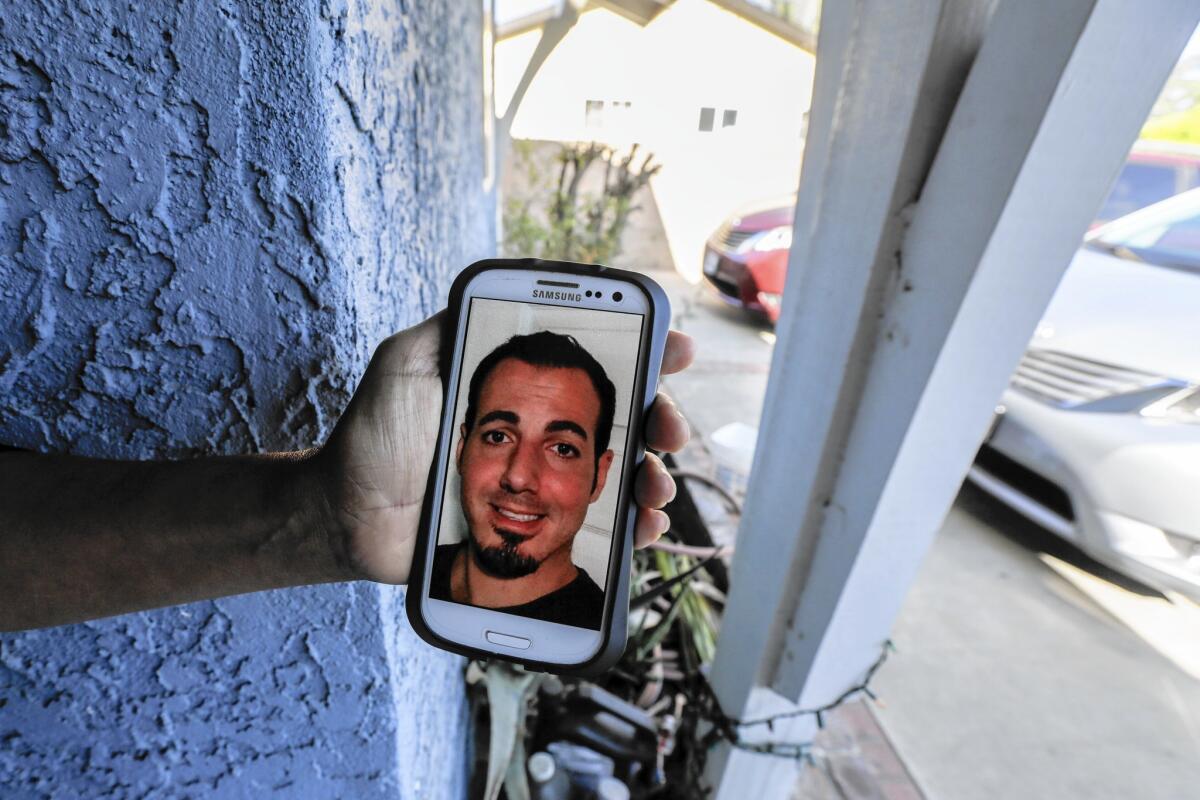Case of father accused of killing gay son filled with complexity and questions

Next-door neighbor Maria Gomez holds her phone displaying a photo of Amier Issa, who was allegedly killed by his father at the family’s North Hills home last week.
A father accused by Los Angeles County prosecutors of killing his son because he was gay is scheduled to be arraigned next week.
But questions remain about the violence last week at the family’s North Hills home that left the son and his mother dead.
Authorities say they are continuing to investigate.
Q: What happened at the house?
Shehada Issa, 69, is being charged with first-degree murder in the shooting of his 29-year-old son, Amir Issa, who was found dead Tuesday morning outside the family’s home on Rayen Street. His arraignment is scheduled for April 11. Found inside the house was Shehada’s wife and Amir’s mother, Rabihah Issa, 68. She had been stabbed, police said, and may have been dead for some time before her body was discovered.
Shehada Issa has not been charged in his wife’s death. Police said he admitted to shooting his son with a shotgun. Amir Issa, who had gunshot wounds to the face and abdomen, was pronounced dead at the scene.
Q: Why do authorities believe the son’s sexual orientation was a factor?
The district attorney’s office alleged in a statement that Issa killed his son because of his “sexual orientation,” a move that brought national publicity to the case over the weekend.
According to the Los Angeles County district attorney’s office, Issa had allegedly threatened to kill his son in the past because he was gay.
See more of our top stories on Facebook >>
“The murder was committed because of the victim’s sexual orientation and because of the defendant’s perception of that status and the victims’ association with a person and a group of that status,” prosecutors alleged in a statement.
Q: What else do we know about the family dynamic?
The Times reviewed court records and interviewed neighbors, who described a more complex picture.
Turmoil appears to have reigned behind closed doors at the Issa home since Amir moved back in with his parents, which neighbors said occurred within the last two years. LAPD Sgt. Greg Bruce said officers had been called to the home to help evict Amir, whose parents were attempting to sell the house against their son’s wishes. The son had even vandalized the house, according to police.
Joel Munoz, 38, has lived across the street from the Issas for 15 years. Speaking through the bars of his driveway gate Saturday, Munoz said he had recently done handiwork for Shehada Issa, who complained to him about what he described as his son’s problems with drugs and mental illness.
“He was a good guy. The son was a bad guy,” Munoz said. “I’m so sorry for the old man.”
Those problems were evident, among other places, on Amir Issa’s Facebook page. In his last post, 10 days before his death, he said he worried that his parents, brother and sister were “literally controlling me in my sleep” and that “they tell people to rape and molest me and make it seem like I enjoy that.”
Read more about the son’s history here.
What about the slaying of the wife?
Police said the condition of Rabihah’s body indicated she may have been dead “for a while” before Amir Issa was shot. LAPD Officer Mike Lopez said she was “stabbed numerous times.” Asked whether Amir Issa might have killed his mother before being shot by his father, Lopez said, “That’s something that detectives will investigate.
Times staff writers Matt Hamilton and Rong-Gong Lin II contributed to this report.
ALSO
What it’s like to live in a city with a $14 minimum wage
Plane slams into car parked on shoulder of freeway; car passenger killed
Police are pushing for a more coordinated crackdown on L.A.’s deadly street racing scene
More to Read
Sign up for Essential California
The most important California stories and recommendations in your inbox every morning.
You may occasionally receive promotional content from the Los Angeles Times.














